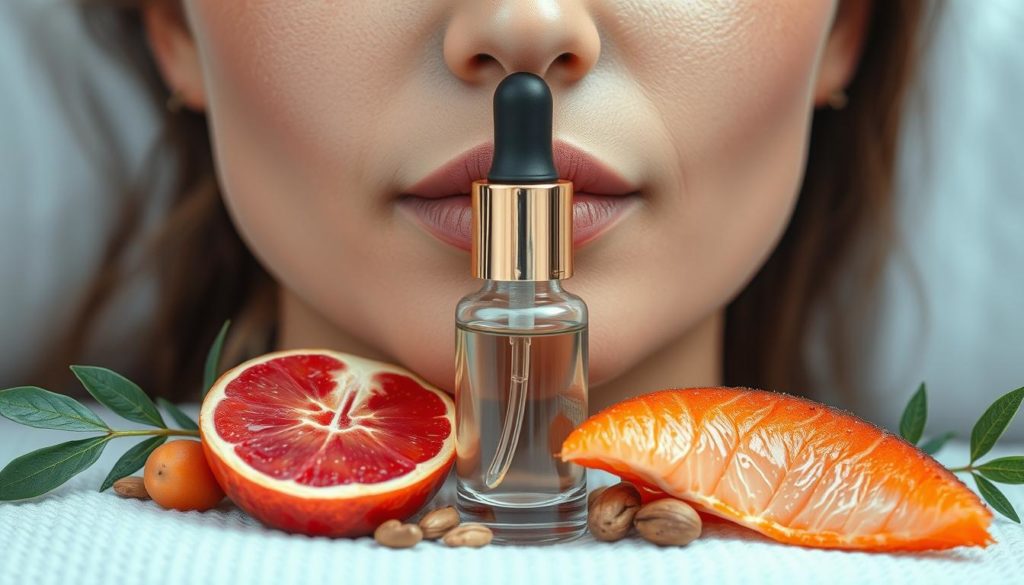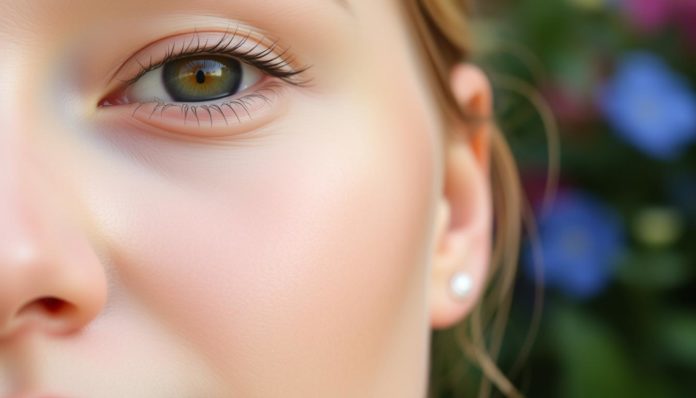Did you know collagen is 75% of your skin’s dry weight? It plays a key role in keeping skin youthful and fresh. Particularly, collagen Types I and III are crucial for your skin’s structure and health.
Together, these collagen types boost skin health. They make it elastic and hydrated. They also help reduce wrinkles and fine lines. Let’s discover how Collagen Type I and III can give you that youthful radiance. We’ll look at their benefits, natural sources, and how to add them to your skincare routine.
What are Collagen Type I and III?
It’s important to know about different collagen types for skin health. Collagen Type I and III play key roles in our bodies. They help keep our skin, bones, and tissues strong and healthy.

Definition and Characteristics
Collagen Type I is the most common type in our bodies, making up 90% of the skin’s layer. It has tightly packed fibers that add strength. Collagen Type III is found with Type I in skin, blood vessels, and organs. These collagens have amino acids like glycine and proline, crucial for their triple helix structure.
Role in Skin Health
These collagens are very important for healthy skin. Type I collagen keeps the skin firm and smooth, avoiding sagging. Collagen Type III provides elasticity and helps repair skin. Together, they keep your skin looking young by keeping it strong and bouncy.
| Collagen Type | Main Characteristics | Role in Skin Health |
|---|---|---|
| Type I | Abundant, densely packed fibers, provides tensile strength | Enhances firmness, prevents sagging |
| Type III | Supports elasticity, found in skin and blood vessels | Promotes elasticity, aids in skin repair |
Collagen Benefits for Skin
Collagen is key to keeping skin healthy. It targets Collagen Type I and III. These contribute to younger-looking skin.
Improving Skin Elasticity
Collagen boosts skin elasticity significantly. Types I and III work together for better skin structure and firmness. This helps the skin stay firm, reducing sagging signs and keeping it looking young.

Reducing Wrinkles and Fine Lines
Collagen also fights wrinkles and fine lines. It ramps up collagen production, improving skin density. This smooths out fine lines and deeper wrinkles for younger skin.
Enhancing Skin Hydration
Collagen is vital for skin hydration too. It helps Types I and III maintain the skin’s moisture barrier. This keeps skin hydrated, leading to a smoother and radiant complexion.
Natural Sources of Collagen
Learning about natural collagen sources helps keep skin young and healthy. By eating certain foods and making lifestyle changes, you can boost collagen naturally.
Foods Rich in Collagen
Eating collagen-rich foods is key for healthy skin. Here are some great choices:
- Bone broth: A traditional source of Type I collagen.
- Fish: Full of collagen and omega-3s.
- Chicken: A good source of Type II collagen.
- Egg whites: Have proline, aiding in collagen creation.
- Citrus fruits: Provide vitamin C, crucial for making collagen.
By adding these collagen-rich foods to your diet, your skin health can improve.
Lifestyle Choices to Boost Collagen
Mixing natural collagen foods with the right lifestyle choices is also important. Here’s how:
- Stay Hydrated: Water keeps skin elastic and helps make collagen.
- Avoid Excessive Sun Exposure: Sunscreen can protect your skin.
- Exercise Regularly: It boosts blood flow and collagen production.
- Quit Smoking: Smoking lessens collagen in your skin.
- Use Collagen-Boosting Skincare Products: Seek out retinoids and peptides.
These habits can help you naturally increase your collagen levels.
| Collagen-Rich Foods | Lifestyle Choice |
|---|---|
| Bone Broth | Stay Hydrated |
| Fish | Avoid Excessive Sun Exposure |
| Chicken | Exercise Regularly |
| Egg Whites | Quit Smoking |
| Citrus Fruits | Use Collagen-Boosting Skincare Products |
How Collagen Supplements Work
Collagen supplements can change how we care for our skin. They usually come from fish or cows and contain hydrolyzed collagen. This means they turn into amino acids after we eat them. Our body then uses these acids to fix and make new collagen, especially in the skin.
These supplements aim to better skin health by offering the needed materials for making collagen. They help our cells, particularly fibroblasts, to produce more collagen. This leads to better skin elasticity, more hydration, and overall better skin condition.
Here’s how collagen supplements help our skin:
- Boosted Collagen Synthesis: They give our body more peptides, which raises collagen levels in our skin.
- Enhanced Skin Elasticity: Taking these supplements regularly helps keep our skin tight and elastic, fighting aging signs.
- Improved Hydration: More collagen means our skin can hold more water, making it look fuller and more hydrated.
Adding collagen supplements to your daily routine can greatly improve your skin. It makes your skin look young and fresh from inside out.
The Science Behind Collagen Protein
Understanding collagen protein is key to knowing its importance for skin health. It is a major structural protein in our bodies. It is found in skin, bones, and connective tissues. Collagen Type I and III are crucial for the skin’s dermis layer.
Collagen production happens through a process called collagen synthesis. In this process, special cells known as fibroblasts create new collagen fibers. This ensures our skin and tissues constantly renew and repair themselves. But, aging, UV rays, and smoking can slow down this process. This leads to less elastic skin and more wrinkles.
Recent studies show how collagen proteins are broken down and renewed. Certain enzymes break down old or damaged collagen. This makes room for new collagen, keeping the skin’s structure and function at its best. Scientists are exploring how lifestyle, diet, and nutrients like Vitamin C help boost collagen production. This could lead to healthier, younger-looking skin.
Choosing the Right Collagen Peptides
Looking for the best collagen peptides can seem tough, but it’s very important. It helps a lot with health benefits and making skin better. It’s key to know the differences between them.
Types of Collagen Peptides
There are many collagen peptides out there. Each type is made for certain health and skin benefits. The main types are:
- Type I: Helps with skin, hair, and nails
- Type II: Good for joint and cartilage health
- Type III: Makes skin firm and elastic
Type I and III focus on skin quality, while Type II helps with joints. Knowing what you need can help reach health goals.
Benefits of Hydrolyzed Collagen
Hydrolyzed collagen is split into small peptides. This makes it easy for the body to use. It works really well for skin.
| Benefit | Description |
|---|---|
| Enhanced Absorption | Smaller collagen peptides make it faster for your body to absorb them. |
| Skin Health | It helps make skin elastic and reduces wrinkles and lines. |
| Joint Health | It’s great for joint function and easing pain. |
| Hair and Nail Growth | Makes hair and nails stronger and grow faster. |
Collagen Synthesis and Production
Understanding collagen production in the body is key for healthy skin. Our bodies naturally produce collagen. Yet, internal and external factors can affect this process. Let’s explore how this works and what impacts it.
Natural Collagen Production
Collagen production starts in the dermis, the skin’s deep layer. Here, fibroblasts, special cells, play a big role. They make collagen by using amino acids like glycine and proline.
This process is crucial for skin tissue repair. It helps our skin stay elastic and strong. Also, vitamin C is important for making collagen stable. It makes them stronger and more effective.
But as we get older, our collagen production drops. This often leads to wrinkles and saggy skin.
Factors Affecting Collagen Synthesis
Many things can affect collagen production, both positively and negatively. Let’s look at some main factors:
- Age: Collagen production goes down as we age, making our skin less firm.
- Nutrition: Eating foods rich in amino acids, vitamins, and minerals supports collagen making.
- Environmental Factors: UV rays and pollutants can damage collagen and slow new production.
- Lifestyle Choices: Smoking and too much alcohol can harm collagen, reducing its production.
Knowing these factors helps us live in a way that helps collagen production. Eating well, caring for our skin, and avoiding bad influences can keep our skin looking young and fresh.
Incorporating Collagen in Your Skincare Routine
Adding collagen into your skincare routine can lead to impressive results. We’ll look at two key methods: topical applications and changes in diet.
Topical Collagen Products
Topical collagen, found in creams and serums, boosts your skin greatly. These products hydrate immediately and improve elasticity. By using these collagen products, your skin will become smoother and firmer. Well-known brands like Olay, Neutrogena, and L’Oréal have effective collagen products.
| Brand | Product | Benefits |
|---|---|---|
| Olay | Regenerist Collagen Peptide 24 | Improves skin texture, reduces wrinkles |
| Neutrogena | Rapid Wrinkle Repair Cream | Boosts hydration, smooths fine lines |
| L’Oréal | Collagen Moisture Filler | Replumps skin, enhances firmness |
Collagen-Infused Diet
Eating a diet rich in collagen helps maintain healthy skin from the inside. Adding collagen-rich foods or supplements increases your body’s collagen. Great sources include bone broth, fish, chicken, and leafy greens.
Here are simple diet tips:
- Incorporate bone broth into soups or stews.
- Add fish and chicken to your meals regularly.
- Snack on leafy greens and include them in salads.
Maintaining a diet rich in collagen benefits your skin immensely. Coupling this with a collagen-focused skincare routine enhances skin health significantly.
Real-Life Results: Experiences with Collagen Type I and III
Many people have shared their experiences with Collagen Type I and III. They added these supplements to their skincare. These personal stories show the real benefits of collagen supplements.
| Person | Age | Collagen Type | Results |
|---|---|---|---|
| Jenna L. | 32 | Type I | Noticed improved skin elasticity and reduced fine lines within 3 months. |
| Michael T. | 45 | Type III | Reported enhanced skin hydration and firmness after daily use for 6 months. |
| Susan K. | 29 | Type I & III | Experienced significant reduction in wrinkles and a glowing complexion after consistent use for 4 months. |
These Collagen Type I and III experiences show how skin health can change. Jenna L. saw her skin become more elastic and had fewer fine lines. This happened after using Type I collagen for three months.
“After six months of using Collagen Type III, I’ve never seen my skin this hydrated and firm,” says Michael T. This shows how important these supplements are for keeping skin young.
Susan K. used both Collagen Type I and III. She noted a brighter skin tone and fewer wrinkles in just four months. This shows how well these collagen types work together.
These stories prove that Collagen Type I and III can really improve skin. These Collagen Type I and III experiences prove the benefits. They also encourage others to try these supplements for better skin.
Final Thoughts on Collagen Type I and III and Youthful Skin
Collagen Type I and III are vital for keeping skin young. We discovered how they make the skin elastic, smooth out wrinkles, and keep it hydrated. They are critical because they are found a lot in our skin, bones, and tissues.
As we get older, our bodies make less collagen. Bad habits like smoking, eating too much sugar, and being in the sun too much can speed up this loss. Even though taking collagen supplements might help, we still need to understand them better. Eating foods rich in amino acids and vitamins can also help your skin stay healthy. To learn more, check out the Cleveland Clinic.
To sum it up, using Collagen Type I and III is great for keeping skin looking young. Adding these proteins to what you eat, your supplements, or skincare products can help a lot. Remember, living a healthy life and using the right skincare products can really change how young your skin looks and feels.
FAQ
What is Collagen Type I and III?
Collagen Type I and III help keep your skin looking young. They make your skin firm and stretchy. This helps your skin stay smooth and fresh.
How do Collagen Type I and III benefit my skin health?
These collagens make your skin stretchy, lessen wrinkles, and keep your skin moist. They help fix your skin from within.
What foods are rich in Collagen Type I and III?
Bone broth, fish, chicken, and egg whites have lots of collagen. Foods with vitamin C also help make more collagen in your body.
What lifestyle choices can boost Collagen production?
Eat well, drink lots of water, avoid too much sun, and don’t smoke. These habits help your body make more collagen.
How do Collagen supplements work?
Supplements have hydrolyzed collagen, which your body can use easily. They keep your skin elastic and hydrated by increasing collagen.
What’s the science behind Collagen protein?
Collagen breaks down into pieces that your body can use to fix and make new skin. Studies show this helps keep your skin strong and young.
How do I choose the right Collagen peptides?
Choose hydrolyzed collagen for better absorption by your body. Pick the type that suits your skin needs best.
What factors affect Collagen synthesis and production?
Your age, what you eat, where you live, and your habits can change how much collagen your body makes. As you get older, you need to help your body by eating right and taking supplements.
How can I incorporate Collagen into my skincare routine?
Use creams and serums with collagen. Also, eat foods or take supplements rich in collagen to keep your skin healthy.
Are there real-life results from using Collagen Type I and III?
Yes, many have seen their skin improve with less wrinkles and more moisture. Their skin looks younger. There are stories and studies that show this.


